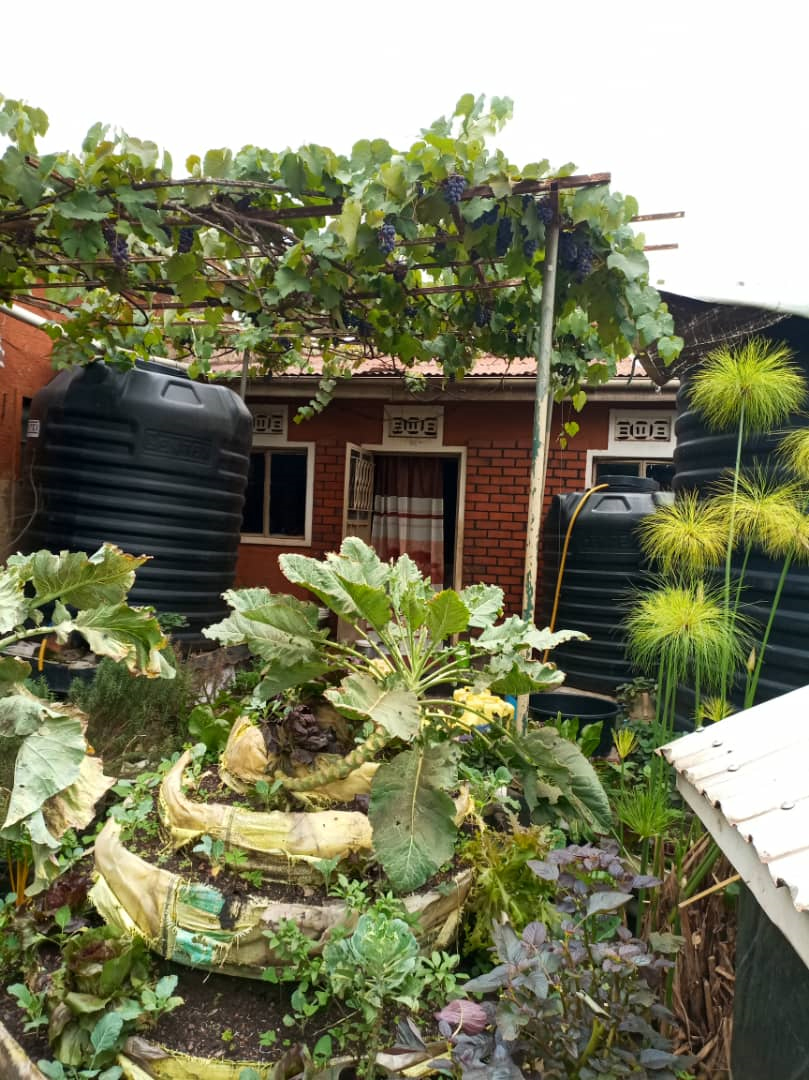Backyard farming: How Nakabaale turned waste into gold
In order to turn her backyard garden into a legitimate business, Nakabaale registered it as Camp Green.
Harriet Nakabaale’s grapes.
Harriet Nakabaale’s Camp Green farm, which is also her home, is surrounded by green vegetables, fruits, poultry houses, and fish tanks.
The farmhouse sits on a 50 x 30ft plot of land at Kawaala in Lubaga municipality, Kampala district.
She is a testimony that one’s resolve, willingness, and determination to solve a problem are strong pillars for success. She is an active urban farmer whose plot has been her lifeline.
“Everything on my farm was started by turning waste into gold. I started with no money and used waste for soils, gardens, and seeds, but now I am reaping large harvests. All you need is determination and zeal to start your dream business,” she advises.
After acquiring this plot over 20 years ago, she transformed her compound into a collection of various containers; from old car tyres to flower vases, sacks, buckets, basins, and boots.
These containers serve as gardens where she cultivates a variety of vegetables, herbs, and fruits.
“I grew up knowing that every woman must have a garden. Lack of land can never be an excuse, and it doesn’t necessarily take huge investments to practice agriculture as a side job. It only takes passion and willingness for one to live their dreams,” she says.
Venturing into farming
Nakabaale had worked as a school secretary for years, a job that availed her an opportunity to save money and buy the land.
“This plot is tiny to many, but when I bought it, I felt like I owned the whole universe because it was big enough for me to do whatever I dreamt of,” she says.
She started planting vegetables, onions and tomatoes in polythene bags, sacks, old tyres, and jerrycans.
“I do not remember how much my initial capital was because I did everything myself. This area is rocky, so I had to improve the soil. I went to rubbish pits got soil and removed all polythene and plastic from it and carried it to my home to make gardens using the containers, which I also collected from waste,” she says.
Whenever she went to the market to buy groceries, she would pick seeds from foods like carrots, tomatoes and mangoes that vendors threw away after they were considered rotten. If she bought three onions, she always kept one and planted it.
In order to turn her backyard garden into a legitimate business, Nakabaale registered it as Camp Green. Ever since then, her "rubbish" has been transformed into a flourishing garden and farm, it has become a tourist attraction, a business, and a study centre.
In it she grows pomegranates and strawberries, eggplants and cauliflowers, dodo, carrots, tomatoes, spring onions, different varieties of peppers, and ground-nuts, among others.
There are herbs — rosemary, lavender, thyme, mint, and lemon balm, leafy greens mixed with root vegetables. Nakabaale has mastered the art of making her own seed for vegetables.
She says the first tomato harvested will give the best seed with the same capacity as the mother plant. “I use egg shells and old egg trays for my nursery beds. This helps me get the best seedlings free from diseases and contamination,” she says.
She uses the same soil, which must be fertilised before being reused. She makes her own organic fertiliser from water hyacinth. She squeezes chlorophyll out of the plant, and then they spray it on the plants to get NPK— which is better than some of the industry-manufactured fertilisers.
Water and irrigation
“At the beginning of the year, I sold rosemary seedlings worth sh2m and bought a 10,000-litre tank to add to the ones I already had. These give me enough water to irrigate my crops during the dry seasons,” she says.
Poultry and markets
Her poultry house has broilers, ducks, guinea fowl, and geese. “I have 100 broilers, although their house can take 300 birds. I feed them well to ensure that by one month I can sell them off and stock others,” she explains.
The market has never been Nakabaale’s challenge because buyers come directly to her home. “I sell each spinach leaf at sh100, and sh500 for each tomato,” she says. A spinach seedling costs sh500, and once planted, one can harvest from it for about two years.
“Each crop can give you sh20,000 for its lifetime. This, therefore, means you will get sh2.2m from each garden,” she adds.
She maintains four-step gardens, generating an income of sh8.8m, in addition to cultivating other crops on the ground and vertical gardens, such as those on the water tanks. She earns an average income of over sh3.5m a month from her 50 x 30ft plot of land.